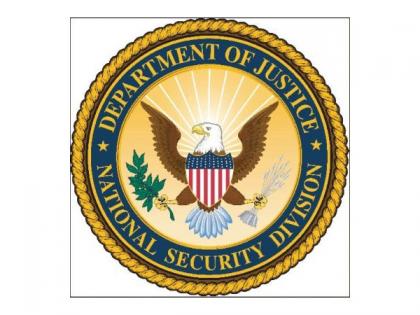US Navy sailor convicted of espionage after selling military secrets to China
By ANI | Updated: August 23, 2025 00:00 IST2025-08-22T23:51:30+5:302025-08-23T00:00:16+5:30
Washington [US], August 22 : On August 20, a federal jury found Jinchao Wei, also referred to as Patrick ...

US Navy sailor convicted of espionage after selling military secrets to China
Washington [US], August 22 : On August 20, a federal jury found Jinchao Wei, also referred to as Patrick Wei, guilty of espionage and violations regarding exports. Wei was serving as an active-duty US Navy sailor at Naval Base San Diego when he consented to sell Navy secrets to a Chinese intelligence officer for USD 12,000, as stated in a release by the US Department of Justice.
After a trial lasting five days and one day of deliberation, the jury found Wei guilty on six counts, which include conspiracy to commit espionage, unlawful exportation of, and conspiracy to export, technical data related to defence articles, in violation of the Arms Export Control Act and the International Traffic in Arms Regulations. Sentencing for Wei is set to occur on December 1.
"The defendant, who took an oath to defend our Nation and was granted a security clearance as a petty officer in the United States Navy, betrayed his country for $12,000," commented Assistant Attorney General for National Security John A. Eisenberg.
"He violated his oath, betrayed his uniform and fellow sailors, and turned his back on his adopted country for money. This verdict serves as a stark warning to those who disregard the serious responsibilities of their positions and their duty to this Nation. Do not let the lure of easy money tempt you, as you will face prosecution and imprisonment," as reported in the release.
"The defendant's behaviour signifies a severe violation of the trust endowed upon him as a member of the US military," stated US Attorney Adam Gordon for the Southern District of California.
"By selling military secrets to the People's Republic of China for cash, he placed not only his fellow sailors at risk but also threatened the security of the entire nation and our allies. The jury's ruling serves as an important reminder that the Department of Justice will diligently pursue traitors," the release emphasised.
"Jinchao Wei took oaths to serve both as a US Navy sailor and a US citizen. He then engaged in espionage by transmitting photographs and videos of the US Navy vessels, information about ship movements, technical manuals, and weapons capabilities to a Chinese intelligence officer," remarked Assistant Director Roman Rozhavsky of the FBI's Counterintelligence Division.
"China persistently targets US military personnel, both those with and without clearances. This guilty verdict demonstrates that the FBI and our partners will thoroughly investigate and hold accountable anyone who endangers US national security. We advise both former and current US government employees to be cautious of anyone offering monetary compensation for their information or opinions and to report any suspicious interactions to the FBI," as stated in the release.
The evidence presented during the trial revealed that Wei was contacted in February 2022 through social media by an individual posing as a naval enthusiast. In reality, this person was a Chinese intelligence officer. From February 2022 until his arrest in August 2023, as their connection grew, Wei sent comprehensive information about the Essex at the officer's request, including photographs, videos, and details about its weaponry.
He also transmitted intricate information about other US Navy ships that he retrieved from restricted US Navy computer systems. In return for this intelligence, the officer compensated Wei with over $12,000 across 18 months.
During the trial, the government introduced evidence that included discussions and various messages exchanged between Wei and his Chinese handler. These communications revealed their attempts to conceal their activities, the directives given by his handler, and the method by which Wei received payment for his services. Besides the two charges of espionage, Wei was found guilty of four counts related to conspiring to breach and breaching the Arms Export Control Act. This law makes it illegal for individuals to knowingly export technical data about a defence article without obtaining a license from the Department of State. The government provided evidence that Wei collaborated with his Chinese handler to export specific technical information that necessitated a license for export, as mentioned in the release.
The investigation was carried out by the FBI and NCIS, with significant support from the US Department of State and the Transportation Security Administration. The prosecution is being handled by Assistant US Attorney John Parmley from the Southern District of California, along with Trial Attorney Adam Barry from the National Security Division's Counterintelligence and Export Control Section, as noted in the release.
Disclaimer: This post has been auto-published from an agency feed without any modifications to the text and has not been reviewed by an editor
Open in app